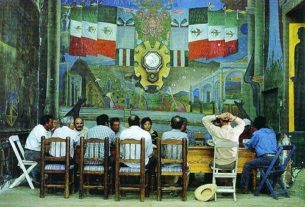This article is a tribute to Consuelo Velázquez, who died January 22, 2005, at the age of 84.
Consuelo Velázquez was one of Mexico’s best known modern songwriters. She wrote her most famous song – “Bésame mucho” – before her 20th birthday. When asked, years later, whose love had inspired the powerful lyrics, she replied that she had written it before she had ever been kissed, and said that the entire song was a “product of imagination”.
Quite some imagination! The song has been translated into more than 20 languages, and been sung in many different styles, by dozens of artists ranging from The Beatles, Frank Sinatra, Wes Montgomery, The Morton Gould Orchestra, Andy Russell, Pedro Vargas, Linda Ronstadt, Valentino’s Sax, Diana Krall and Plácido Domingo to Sammy Davis Jr., Magdalena Zárate, Jose Carreras, Joao Alberto, Elvis Presley and Mexican heart-throb Luis Miguel.
Words of “Bésame mucho” (Consuelo Velázquez)
Bésame, bésame mucho,
Como si fuera esta noche la última vez.
Bésame, bésame mucho,
Que tengo miedo perderte,
Perderte otra vez.
Quiero tenerte muy
Cerca, mirarme en tus
Ojos, verte junto a mí,
Piensa que tal vez
Mañana yo ya estaré
Lejos, muy lejos de ti.
Bésame, bésame mucho,
Como si fuera esta noche la última vez.
Bésame mucho,
Que tengo miedo perderte,
Perderte después.
Unofficial English translation:
Kiss me, Kiss me a lot,
As if tonight were the last time.
Kiss me, kiss me a lot,
Because I’m afraid of losing you,
To lose you again.
I want to have you very close
To see myself in your eyes,
To see you next to me,
Think that perhaps tomorrow
I already will be far,
very far from you.
Kiss me, Kiss me a lot,
As if tonight were the last time.
Kiss me, a lot,
because I’m afraid of losing you,
To lose you later.
Consuelo Velázquez was born in Ciudad Guzmán, Jalisco, on August 21, 1920, but grew up in Guadalajara. She began playing piano when she was 4, gave her first public recital at age 6, and moved to Mexico City in her teens to attend the National Conservatory and the Palace of Fine Arts. She became a concert pianist and started writing popular songs shortly afterwards, while overseeing classical music programs for the pioneering radio station XEQ.
“Bésame mucho”(Kiss me a lot) was first recorded in 1941 (by Emilio Tuero and Chela Campos) and became a huge Big Band hit during the Second World War. In 1999, the song, the only Mexican song ever to have topped the U.S. hit parade for 12 straight weeks, was declared the “Song of the Century” at a Univisión event in Miami, Florida.
In addition, “Bésame mucho” featured in several movies, including “A toda máquina” (1951), “The moon over Parador” (1988), “Sueños de Arizona” (1993), and “Moskva Slezam ne Verit”, a Russian movie which won the 1980 Oscar for Best Foreign Film.
“Bésame mucho” brought fame and numerous awards to Consuelo Velázquez, including a Special Citation of Achievement Award from the U.S. Broadcast Music Incorporated. Invited to Hollywood to meet the legendary Walt Disney, she found him to be “nice, kind and respectful.” Velázquez agreed to work in Disney’s “The Three Caballeros”. During the filming of this movie, Rita Hayworth stopped by and insisted on meeting Velázquez.
According to her close friends, Consuelo Velázquez remained a gentle, humble person throughout her life, often telling anecdotes about her life as if she was talking about someone else. She continued to play the piano most afternoons until well into her 80s.
Among other songs that she wrote that were popular in their day are “Yo no fui” (sung most famously by Pedro Infante), “Anoche”, “Al nacer este día”, “Aunque tengas razón”, “Déjame quererte”, “Pensará en mí”, “Amar y vivir”, “Que seas feliz” (interpreted recently by Luis Miguel), “No me pidas nunca”, “Chiqui”, “Volverás a mí”, and “Cachito”. When she died, she had only just finished another song – “Por el camino” – written especially for Luis Miguel’s next album.
Consuelo Velázquez, “Consuelito”, can rightfully be considered Mexico’s greatest ever female composer. Her life and her songs will be remembered with great affection by music-lovers everywhere for years to come.
Que descansa en paz – May she rest in peace.
This article is the basis for Chapter 27 in the author’s Mexican Kaleidoscope: myths, mysteries and mystique (Sombrero Books, 2016).




My Aunt Chela Campos told me the story of when she first heard the song. It was at a party at Consuelo’s house when she told Aunt Chela about her new song, Besame Mucho. Her pianist started to playing it for them, Consuelo wanted Emilio Tuero to sing it, but he said no, that it was more of a woman’s song and didn’t feel it. Aunt Chela said she would sing it, so they decided to record it together.